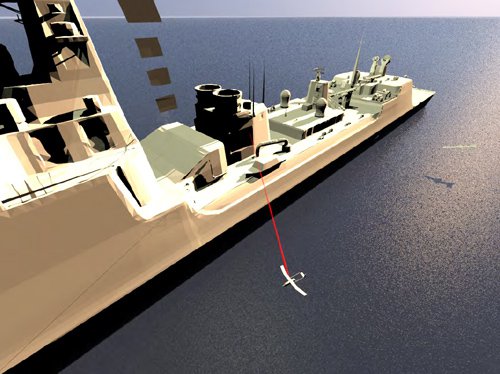
Simulated laser designation of a target unmanned aerial vehicle and incoming missile using real-world models of threats and potential targets.
JPL Robotics will support DH Wagner Associates to develop a Distributed Enhanced Collaborative Operations in Denied Environments (DECODE) system to provide the key Team Level Autonomy capabilities requested by DARPA. Wagner and JPL will also demonstrate the value of these capabilities using a realistic JPL simulation environment. The innovative Algorithms and Software (A&S) to be developed, tested, and evaluated will be a Denied Environment Data Fusion (DEDF) beyond-state-of-the-art cognitive capability for maintaining an as-accurate-and-mission-relevant-as-possible Common Situational Awareness Picture (CSAP) in a denied environment. This will use accurate, efficient, flexible, scalable, and resilient Distributed Multiple Hypothesis Data Fusion (DMHDF) algorithms and effective Information Flow Optimization (IFO) algorithms. The benefit to DARPA will be a system that provides unprecedented effectiveness and resilience for autonomous systems in real-world adversarial environments. This capability will enable agents to operate intelligently to satisfy mission objectives despite dynamic conditions and uncertainty in the form of contradictory observations, competing resources, and task priority.
To verify DECODE system correctness in a closed-loop simulation environment, JPL will develop an integrated solution utilizing existing JPL modeling and simulation software that has been deployed for previous DARPA, NAVY and NASA sponsored projects, including DARPA ACTUV and NASA Mars rover flight projects. JPL will test and evaluate DECODE using representative vehicle performance and mission scenario data, and will develop environment models to simulate the denial of intra-vehicle communication. This will be done for a variety of nominal and off-nominal (denied communication) scenarios, as well as for other denied information scenarios, such as decoy and/or camouflaged vehicles and structures. Because DECODE will have an extensible and re-configurable architecture, system testing for a wide range of single vehicle, as well as team level autonomy, and mission scenarios will be supported.


